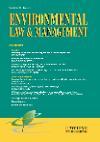Environmental Law and Management - Volume 33 - Issue 1

Articles
Investing in land for natural capital: the Scottish experience
COLIN T REID
University of Dundee
In Scotland it is recognised that land use has a significant part to play in tackling the dual climate and biodiversity crises, and that large-scale investment from the private sector will be needed. Attention needs to be paid to the legal vehicles through which external investment in natural capital can be directed and the benefits and risks that are inherent in such long-term projects.
Ecocide: the domestic
DAVID POCKLINGTON
Honorary Research Fellow, Centre for Law and Religion, Cardiff Law School
Although it is unlikely to become law, the UK Ecocide Bill serves the purpose of raising the issue of ecocide within the public domain and determining the level of support it might have. Although it is a concept that has been discussed at the UN and European levels, it is suggested that incorporating the crime of ecocide in the domestic law of a significant number of states could have a greater overall impact.
Climate change and charity trustees: the world in 2024
ROBERT NIERI
Legal Director, Shoosmiths LLP Solicitors
CARLI BALDASARE
Wealth Manager, Charities, Tribal Impact Capital
How can charity trustees factor the climate emergency into their decision-making even if their charitable purpose does not include environmental protection and improvement? The latest guidance from the UK Charity Commission offers some key considerations for trustees when deciding how to invest excess funds and whether it may be appropriate for them to do more than seek the best financial return.
Accelerating EU mineral permitting: the Critical Raw Materials Act
ELENI DIAMANTOPOULOU
Womble Bond Dickinson (UK) LLP, London
This Act establishes a framework for ensuring a secure and sustainable supply of the raw materials that are important for renewables technologies by means of a streamlined permit-granting process. The Act addresses the problem of hitherto complex administrative procedures and the question of public participation, given that meaningful engagement with affected communities is of paramount importance for a project to succeed.
Case Commentaries
European Court of Human Rights rules that climate change mitigation is an actionable right under Article 8
Verein Klimaseniorinnenv Switzerland[2024] ECHR 304, no 53600/20
ROSALIND ENGLISH
Academic Consultant, 1 Crown Office Row
The decision that states are under a positive obligation under Article 8 ECHR to provide effective protection from the serious adverse effects of climate change on people’s lives and health suggests that averting climate change is an inherent part of states’ obligation to protect human rights.
River management programmes: generic goals not enough
R (on the application of Pickering Fishery Association) v Secretary of State for the Environment, Food and Rural Affairs
[2023] EWHC 2918 (Admin)
ROSALIND ENGLISH
Academic Consultant, 1 Crown Office Row
In this application for judicial review, the High Court agreed with the claimant that applying a generic framework across a whole river basin district was not a correct approach to addressing poor water quality. The focus should instead be on individual stretches of water and their own environs and problems.
UK Government’s climate change plan found to be unlawful for the second time
Friends of the Earth and Others v Secretary of State for Energy Security and Net Zero
[2024] EWHC 995 (Admin)
ANDREW LIDBETTER, NUSRAT ZAR, JAMES WOOD, JASVEER RANDHAWA
Herbert Smith Freehills LLP, London
The UK Government’s Carbon Budget Delivery Plan has again been found to be unlawful, on grounds which include ‘vague, unquantified and incomplete information’. The government should now produce a third report that meets its obligations under the Climate Change Act 2008.
Strategic Issues – Scotland
SARAH HENDRY
Dundee Law School and UNESCO Centre for Water Law, Policy and Science, University of Dundee
News Reports - EU and UK
Behind the Headlines - The ‘forgotten’ greenhouse gases
DAVID POCKLINGTON
Centre for Law and Religion, Cardiff Law School
